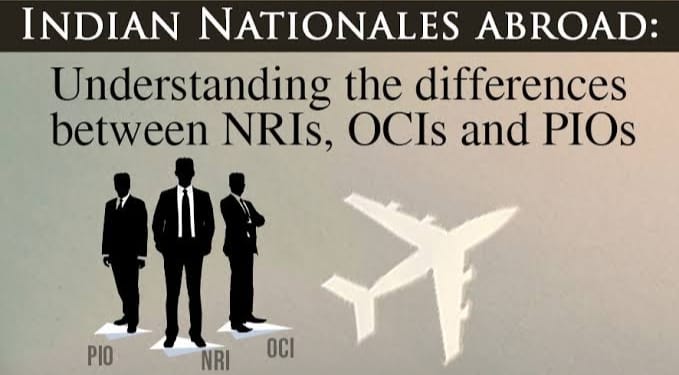 Image Source: SCC Online
Image Source: SCC Online
NRI, OCI, and PIO Defined: What Sets Them Apart?
NRI (Non-Resident Indian):
An NRI is an Indian citizen residing abroad for more than 182 days during a financial year. NRIs possess Indian passport and citizenship, a right to vote, and a right to property in India, including agricultural property. Their status affects tax process and investment in India but does not grant them a visa to travel to India.
OCI (Overseas Citizen of India):
OCI is a type of long-term residence for foreign citizens of Indian origin in a foreign country. OCI is granted a life, multiple-entry visa to India, and the OCI can stay, work, and study in India for life. Although OCIs enjoy nearly all the same advantages as NRIs—i.e., economic, educational, and financial parity—they cannot vote, become public servants, or purchase agricultural land. OCI is established because India does not allow dual citizenship, so OCI is not citizenship but a special status.
PIO (Person of Indian Origin):
PIO was a class of foreign nationals of Indian origin who had a 15-year visa and some rights in India. Nonetheless, the PIO scheme was merged into the OCI scheme from January 2015. All previous PIO cards are OCI cards, and new PIO cards are not issued. The PIO cardholders are requested to replace their PIO cards with OCI cards, with the current deadline for conversion being extended up to December 31, 2025.
Key Differences:
-
NRI stands for Indian citizen abroad, OCI and PIO for foreign nationals of Indian origin.
-
NRI has Indian citizenship and the right to vote; OCI/PIO does not.
-
OCI offers a lifetime visa and more privileges than the earlier PIO (which has since been replaced by OCI).
-
Only NRIs can own agricultural land; OCIs/PIOs cannot, except by inheritance.
-
PIO is no longer valid—shift to OCI for additional advantages and travelling.
India Renews Validity of PIO Card During New Digital OCI Rollout—What NRIs and OCIs Need to Know in 2025
Recent Updates:
-
Indian government has extended the validity of PIO cards until December 31, 2025, and thus PIO card holders are still permitted to travel with their cards to India. Nevertheless, all PIO card holders are advised in strong terms to get their cards converted to OCI before the cut-off date since PIO cards are no longer officially accepted for immigration and can be made null and void if international travel rules are changed.
-
The OCI card is still the main document for foreign Indians, providing a lifelong visa with multiple entries, and enormous privileges in India—save for voting, public office, and agricultural land.
-
India rolled out pilot testing of a new digital OCI smart card in 2024-2025 at some consulates in the US and Europe. It is to simplify immigration and compliance, with full implementation later in 2025. The government is also tightening scrutiny of applications and updating rules for OCI holders.
-
NRIs and OCIs can now obtain Aadhaar cards on new, eased standards, subject to the fulfillment of specific requirements. These will make financial transactions and access to services in India easier for the diaspora.
-
The government has clarified that OCI status does not affect tax residency; physical presence in India, rather than possession of an OCI card, is what leads to taxation.
Source: Consulate General of India, Toronto; Savory & Partners; The Hindu; Indian Express; Policybazaar; HDFC Bank; IndianEagle TravelBeats.
Advertisement
Advertisement






